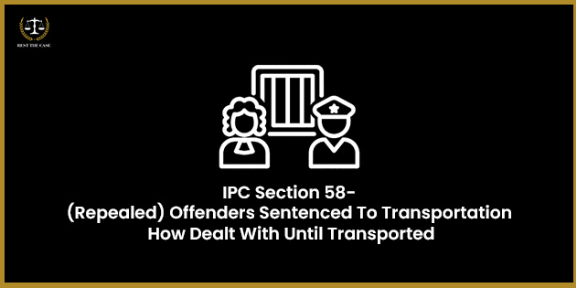IPC
IPC Section 58 (Repealed): Offenders Sentenced to Transportation How Dealt With Until Transported

During the British colonial era, India’s penal system included the practice of transportation, a form of punishment where convicts were exiled to remote colonies or penal settlements. Section 58 of the Indian Penal Code (IPC) governed how such convicts were to be managed after sentencing but before physical transportation took place. Though this provision has long been repealed, it reveals much about the evolution of punishment, administration, and the colonial mindset toward criminal justice in 19th-century India.
What We’ll Explore in This Blog:
- The original meaning and legal explanation of IPC Section 58
- The practice of transportation as a form of punishment
- How convicts were managed before being transported
- The repeal of this provision and its irrelevance in modern law
- What replaced such punishment practices post-independence
- Why is this section still relevant for historical and legal analysis
What Was IPC Section 58?
Legal Text (Before Repeal):
"Offenders sentenced to transportation, how dealt with until transported?"
Simplified Explanation:
Section 58 specified the temporary custodial treatment of offenders who were sentenced to transportation but had not yet been physically moved to the penal settlement. In essence, it allowed authorities to detain such convicts in local prisons or other designated facilities until the actual act of transportation occurred. This provision was administrative in nature, offering legal cover for the delay between sentencing and execution of transportation orders.
Understanding the Practice of Transportation
In colonial India, transportation was a common punishment for serious crimes. Convicts were sent to penal colonies such as the Andaman Islands (especially Cellular Jail) or other far-off British territories. It was intended to be harsher than imprisonment, combining exile, hard labor, and social separation. Transportation served both punitive and deterrent purposes while also being a form of political control. It was especially applied in cases of rebellion, mutiny, and other serious offenses where the British wanted to remove individuals from the general population.
Purpose and Application of Section 58
Section 58 played a procedural role in criminal justice by:
- Legally permitting authorities to hold convicts in local custody after a sentence of transportation
- Providing administrative flexibility to accommodate delays in arranging transportation logistics
- Ensuring continuity of legal custody until the convict was physically sent away
It essentially bridged the gap between court sentencing and execution of the transportation order, thereby preventing legal loopholes or custodial disputes during the interim period.
Repeal and Redundancy Post-Independence
After India gained independence in 1947, the country moved toward uniform, humane, and constitutionally compliant punishments. The practice of transportation was seen as archaic, colonial, and in conflict with Article 14 (equality before law) and Article 21 (right to life and personal liberty) of the Constitution of India. Transportation as a punishment was formally abolished in 1955, and IPC Section 58 was repealed along with related provisions. Imprisonment replaced transportation, and the entire criminal justice system was redesigned to reflect modern penal philosophies such as reform, rehabilitation, and due process.
What Replaced Section 58?
- Transportation to penal colonies was replaced with rigorous imprisonment or life imprisonment, as per the severity of the offense.
- The Criminal Procedure Code (CrPC) and Prison Acts now provide comprehensive rules on how convicts are to be dealt with post-sentencing.
- The Indian Penal Code was amended to remove all references to transportation, replacing them with standardized imprisonment terms.
Why It Still Matters
While IPC Section 58 no longer holds legal relevance, it is important from a legal-historical standpoint for several reasons:
- It reflects the colonial approach to punishment and criminal administration.
- It offers insights into how legal systems were structured to enforce imperial control.
- It reminds us of the transition India made from imperial laws to a rights-based legal framework after independence.
- It helps law students and researchers understand the evolution of penal jurisprudence in India.
Conclusion
IPC Section 58, though repealed, once played a role in managing the procedural aspects of the colonial punishment of transportation. It allowed authorities to legally hold convicts until their transfer to penal colonies could be arranged. Its repeal signaled India’s move away from colonial penal practices toward a more constitutional, reform-oriented system of justice. The modern Indian criminal justice system no longer recognizes transportation as a punishment. Instead, it adheres to well-defined custodial standards grounded in constitutional guarantees and modern legal principles. Studying this provision helps us understand how far India has progressed in humanizing its penal laws and correcting the inequalities of its colonial past.
Frequently Asked Questions
Q1. What was IPC Section 58 about?
It dealt with how convicts sentenced to transportation were to be held in custody until they were physically transported to a penal settlement.
Q2. What is meant by transportation as punishment?
Transportation involved exiling convicts to remote penal colonies like the Andaman Islands, often for long periods involving hard labor and social isolation.
Q3. Is Section 58 still in force?
No, section 58 was repealed after the practice of transportation was abolished in India in 1955.
Q4. What replaced this provision?
Imprisonment terms, including rigorous and life imprisonment, replaced transportation. The CrPC and Prison Acts now govern post-sentencing procedures.
Q5. Why is this section relevant today?
Though repealed, it is studied for its historical significance and to understand the development of India’s penal system during and after the colonial era.






